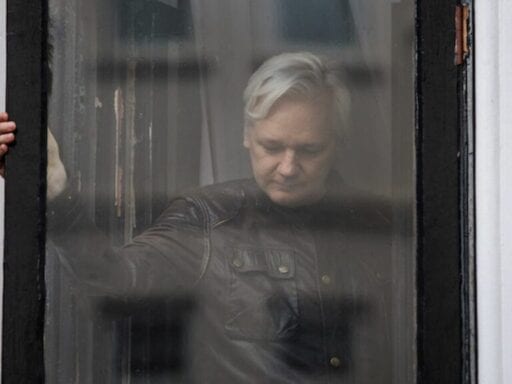Vox Sentences is your daily digest for what’s happening in the world. Sign up for the Vox Sentences newsletter, delivered straight to your inbox Monday through Friday, or view the Vox Sentences archive for past editions.
WikiLeaks’ founder is arrested in London; New Zealand’s Parliament passes a ban on semiautomatic weapons.
Assange arrested
/cdn.vox-cdn.com/uploads/chorus_asset/file/16026364/4.11.jpg) Jack Taylor/Getty Images
Jack Taylor/Getty Images- Julian Assange, the founder of WikiLeaks, was arrested Thursday by British police on multiple charges, including in the United States. He has been found guilty of skipping bail in the UK and faces up to 12 months in jail. [Guardian]
- The US is seeking extradition of Assange on a charge of “conspiracy to commit computer intrusion.” Prosecutors say he tried to help then-US intelligence analyst Chelsea Manning break into a government computer in 2010. The charge carries a maximum sentence of five years in prison. [Axios]
- Under Assange’s lead, WikiLeaks has posted numerous classified documents on topics ranging from military documents about the Iraq and Afghanistan wars to hacked emails from Hillary Clinton’s presidential campaign. To dodge charges from the United States, and a separate 2012 investigation of sexual assault allegations in Sweden, Assange asked Ecuador for political asylum in 2012 and had been staying in the country’s embassy in London ever since. [Washington Post / William Booth, Karla Adam, Ellen Nakashima, and James McAuley]
- Ecuador gave a list of reasons for revoking Assange’s asylum, ranging from what it said were attempts to interfere with Ecuador’s relations with other countries to his general “rudeness.” [Guardian / Dan Collyns]
- Notably, Assange is not being charged for posting leaked material on his website, an act the Department of Justice had considered arresting him for in the past. [Politico / Caitlin Oprysko and Kyle Cheney]
- Activists for freedom of speech and the press have pushed back against such possibilities because it could set a dangerous precedent. Many news organizations use leaked classified materials to inform the public. [Vox / Andrew Prokop]
- The Justice Department said it has no additional information to release for now. Questions linger over whether additional charges will be brought against Assange –– especially any related to espionage. [Twitter / Zoe Tillman]
New ban on semiautomatic weapons in New Zealand
- New Zealand’s Parliament passed a ban on most types of semiautomatic weapons on Wednesday, 119 to one. It started as a temporary restriction after the mosque shootings in Christchurch that killed 50 people; now, after royal assent from the governor general (largely seen as a formality), it will become a permanent law. One of the banned weapons is the AR-15, which the mosque shooter used. [Slate / Elliot Hannon]
- It took only one mass shooting to occur for New Zealand to decide to implement these restrictions. The ban includes a six-month buyback program that allows owners of semiautomatic weapons to get rid of them. [Vox / German Lopez]
- If citizens do not comply with the buyback during those six months, they will be subject to up to five years in prison and all their remaining prohibited weapons will be confiscated. There are exemptions for pest control professionals and licensed antique gun collectors. [NPR / Matthew S. Schwartz]
- Prime Minister Jacinda Ardern, speaking before lawmakers, said she knew a ban like this would be passed after a police commissioner described the deadliness of the guns, which can be easily modified to hold more than 60 bullets per magazine. “We are ultimately here because 50 people died and they do not have a voice,” Ardern said. [NPR / Matthew S. Schwartz]
- The ban was declared less than a month after the shootings. Meanwhile, the US, which experiences far more mass shootings, has become accustomed to “thoughts and prayers” and little action from lawmakers in the wake of gun violence. [Daily News / Jessica Schladebeck]
Miscellaneous
- Say hello to a long-lost relative! Scientists say they might have evidence of a new human species from about 50,000 years ago. [BBC / Paul Rincon]
- Police say they’ve solved a 46-year-old cold case, arresting a man they suspect of killing two teens in Virginia Beach in 1973. [CNN / Eric Levenson and Julia Jones]
- What should you do if you’re on the “Most Wanted” list? Definitely not taunt the police on Facebook like this woman did. [Fox News / Louis Casiano]
- A New York “clean Chinese” restaurant touting supposedly healthier food is being accused of perpetuating racist stereotypes. [BuzzFeed News / Julia Reinstein]
- South Korea overturning its ban on abortion is a huge progressive leap for the country, one of the few developed nations to criminalize abortion. [WSJ / Eun-Young Jeong]
Verbatim
“Curious eyes never run dry in my experience.” [Julian Assange to Chelsea Manning in 2010, according to court documents the Justice Department unsealed Thursday]
Watch this: How Leonardo da Vinci made this “satellite” map in 1502
Leonardo da Vinci is known for his art and inventions — but also his groundbreaking maps, like this one of Imola, Italy. In this episode of Vox Almanac, Phil Edwards explores how it was made. [YouTube / Phil Edwards]
Read more
Online shopping’s golden age of free, easy returns is ending
9 questions about the border crisis you were too embarrassed to ask
Israeli democracy is rotting from the inside
The past 20 years of culture wars, explained by the word “wholesome”
Why conspiracy theories are getting more absurd and harder to refute
Author: Catherine Kim
Read More



